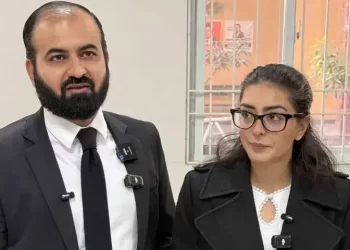Growing rates of malnourishment are compromising the health of a people battered by Israel’s war, preventing them from ever fully recovering.
Dr Mohammed Harara, 28, had barely begun working as a general practitioner when he was thrust to the front lines of a warzone, forced to become a jack-of-all-trades.
In the nearly eight months since Israel launched its offensive on Gaza, Harara has seen more than he thought he ever would.
Like the maggot-infested wounds of the maimed that he has had to stand by and helplessly look at.
Lacking medication and even basic hygiene materials, Harara and his colleagues are not able to clean – or keep clean – festering wounds.
Also complicating their struggles are the patients’ severely compromised physical conditions, which are slow to heal and can make such an infestation lethal.
“Slowly, these unhygienic conditions caused the body to go into sepsis and people were dying,” he told media.
As she and her colleagues from British charity Medical Aid for Palestinians entered the besieged territory from Egypt, through the Rafah crossing, Qureshi remembers a welcoming atmosphere.
An “I love Gaza” sign greeted the team and the April weather was “perfect”, she recounts.
“I remember staring at that [sign], realising just how privileged I was to have been able to come to Gaza,” Qureshi told media.
But as they rolled out on the crossing’s other side, the devastation of Israel’s assault was everywhere, she said.
On the drive to Deir el-Balah, in central Gaza, the surgeon saw thousands and thousands of displaced Palestinians, many of whom were very frail and thin.
The displaced, the wounded, the frail
Once they arrived at Al-Aqsa Martyrs Hospital, Qureshi saw hundreds more frail, wounded displaced Palestinians crowded in every available space – in the reception area, on every floor, in the stairwells.
She was particularly pained to see children whose clothes were hanging off their small frames, the opposite of a healthy child steadily outgrowing their clothes, she said.
For these individuals, their immunity and their ability to heal were reduced, she added.
“The ability for cells to divide in the absence of vital nutrients that come from fresh food – and they have had no intake of such fresh foods for such a long period of time – [makes it] extremely difficult for the mind and the body to recover and regenerate,” Qureshi said.
Before the war, Palestinians in Gaza were already suffering from micronutrient deficiencies, largely due to the Israeli blockade, according to Amber Alayyan.
But since October 7, rates of acute malnutrition are rising rapidly, the malnutrition expert, paediatrician and deputy manager for Doctors Without Borders (Medecins Sans Frontieres, or MSF) in Palestine, said.
Micronutrient deficiency is the term used to describe a lack of essential vitamins and minerals that our bodies need to function. But acute malnutrition is a larger issue, which leads to the wasting away of one’s fat and muscle stores, Alayyan said.
“When you’re starting to worry about a population that doesn’t have any access to food, that’s when you start screening for malnutrition,” she told media.
But the war has rendered even screening impossible. Due to destroyed hospitals and medical labs, doctors from MSF and other aid organisations are unable to run blood tests to confirm malnutrition among Palestinians in Gaza as they normally would, Alayyan said.
Instead, they are making diagnoses based on clinical symptoms, she said.
Among the symptoms are fatigue, complications from injuries including the development of chronic diseases, complications in pregnancy, and poor healing of wounds and burns, the doctor said.
The inability to heal from injuries is also deepened by poor hygiene and infection control, Alayyan said, conditions that her team, and doctors like Harara and Qureshi, have seen firsthand in Gaza.
“You’re more at risk of getting infections when your body is not well-nourished … tissues need to be healthy and effectively well-fed to be able to close over a wound,” she explained.









